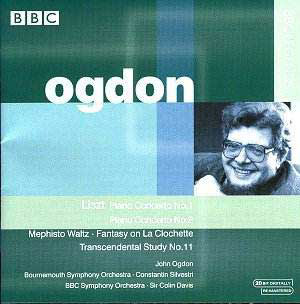Thirteen years have passed since the untimely death in 1989 of John
Ogdon at the age of 52, but none who experienced his special blend of
musical insight and technical brilliance will ever forget him. I last
heard him ‘live’ in the mid-1980s. By then, he had recovered sufficiently
from the dreadful affliction which had brought his dazzling career to
a sudden halt in 1973 to enable him to embark on a limited concert schedule.
Characteristically, it was not an old warhorse that he played on that
occasion, but the Second Piano Concerto of Alan Rawsthorne. True,
some of his old fire had deserted him, but he had lost none of his unique
charisma – I particularly recall the affection which he lavished on this
fine work. (A further reason for remembering this concert was that, if
my memory serves correctly, Sir Charles Groves was the conductor: another
musician notable for championing unfashionable causes.)
So, this disc, which captures Ogdon at the height of
his powers, is to be treasured – especially since none of the tracks
emanates from a recording studio. Liszt, I suppose, is still a controversial
composer: for some, a deep musical thinker; for others, a bombastic
showman. Ogdon’s supreme virtue was his ability to reconcile these poles
of opinion. This is best illustrated in his explosive account of the
Mephisto Waltz no 1, where he combines amazing virtuosity with
seamless structural mastery. He also revels in the grotesque figurations
and harmonic distortions of La Campanella. Harmonies du Soir
is technically even more demanding: here, Ogdon sails through majestically:
he takes risks, almost all of which he surmounts.
Of the two concertos recorded here, I prefer the first.
In both, Ogdon’s command of filigree passage-work, bold declamation,
tender musings and – a particular characteristic – electrifying glissandi
flourishes are equally in evidence. And structural momentum is firmly
maintained throughout. The difference lies in the accompaniments. Both
conductors are in total sympathy with the soloist, but the Bournemouth’s
generally warm if a little ‘boxy’ sound is distinctly superior to that
of the BBCSO, which is unfocused and marred by coarse brass. Nevertheless,
unreservedly recommended.
Adrian Smith
|


![]() See
what else is on offer
See
what else is on offer 